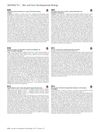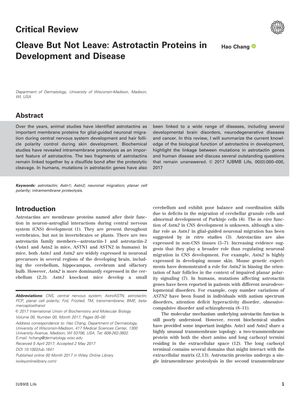TLDR Astrotactin proteins are important for brain and skin development and are linked to several neurodevelopmental disorders.
In the 2017 review, Hao Chang explored the functions of astrotactin proteins, Astn1 and Astn2, in the development of the central nervous system and skin, as well as their links to various diseases. Astrotactins are crucial for neuronal migration in the CNS and hair follicle orientation in skin. Astn1 knockout mice showed a reduced cerebellum size and coordination issues, while Astn2's role in CNS is less understood but is believed to be similar to Astn1. Mutations in astrotactin genes are associated with neurodevelopmental disorders like autism, ADHD, OCD, and schizophrenia. The review emphasized the need for more research into astrotactin's molecular mechanisms and their disease roles, noting that despite intramembrane proteolysis, the cleaved fragments of astrotactins remain connected by disulfide bonds.
8 citations
,
January 2017 in “Journal of Biological Chemistry” Astrotactin-2 is cleaved in a specific way that helps understand its maturation.
 29 citations
,
February 2013 in “Proceedings of the National Academy of Sciences of the United States of America”
29 citations
,
February 2013 in “Proceedings of the National Academy of Sciences of the United States of America” Loss of Fz6 disrupts hair follicle and associated structures' orientation.
55 citations
,
November 2010 in “Development” Hair follicles in mutant mice self-organize into ordered patterns within a week.
92 citations
,
April 2009 in “Journal of Investigative Dermatology” The Celsr1 gene is crucial for normal hair patterning in mice.
8 citations
,
January 2017 in “Journal of Biological Chemistry” Astrotactin-2 is cleaved in a specific way that helps understand its maturation.
9 citations
,
December 2022 in “Genes” CNVs influence hair length in Tianzhu white yaks.
 2 citations
,
August 2023 in “Development”
2 citations
,
August 2023 in “Development” Hair follicles in the back of the rosette fancy mouse have reversed orientations due to a gene mutation.
 April 2017 in “The journal of investigative dermatology/Journal of investigative dermatology”
April 2017 in “The journal of investigative dermatology/Journal of investigative dermatology” Astrotactin2 affects hair follicle orientation and skin cell polarity.
 71 citations
,
January 2019 in “International journal of biological sciences”
71 citations
,
January 2019 in “International journal of biological sciences” Exosomes from dermal papilla cells help hair growth by making hair follicle stem cells multiply and change.




